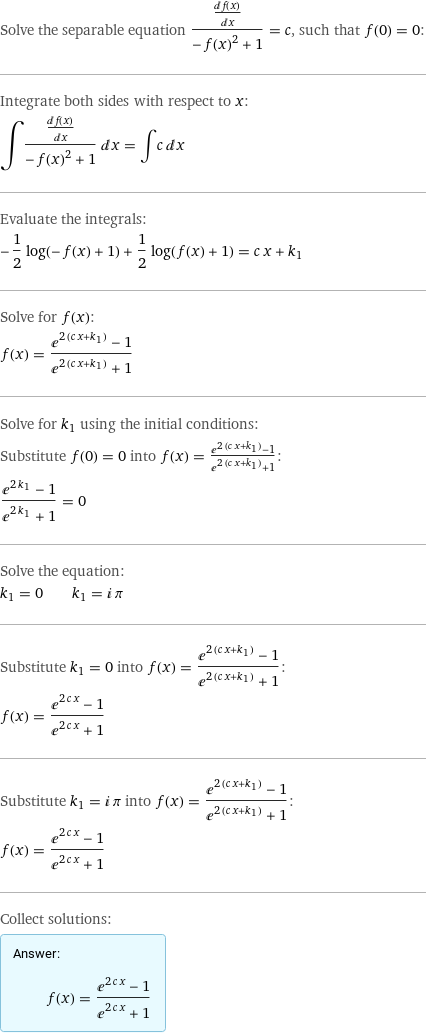|
|
由WolfreeAlpha得Step-by-step solution
Solve the separable equation ${\frac{\rmd f(x)}{\rmd x}\over-f(x)^2 + 1} = c$, such that $f(0) = 0$:
Integrate both sides with respect to $x$:
\[\int{{\rmd f(x)\over\rmd x}\over-f(x)^2 + 1}\rmd x = \int c\rmd x\]
Evaluate the integrals:
\[-\frac12\log(-f(x) + 1) + \frac12 \log(f(x) + 1) = c x + k_1\]
Solve for $f(x)$:
\[f(x) = {e^{2 (c x + k_1)} - 1\over e^{2 (c x + k_1)} + 1}\]
Solve for $k_1$ using the initial conditions:
Substitute $f(0) = 0$ into $f(x) = {e^{2 (c x + k_1)} - 1\over e^{2 (c x + k_1)} + 1}$:
\[{e^{2 k_1} - 1\over e^{2 k_1} + 1} = 0\]
Solve the equation:
\[k_1 = 0\quad|\quad k_1 = i π\]
Substitute $k_1 = 0$ into $f(x) = {e^{2 (c x + k_1)} - 1\over e^{2 (c x + k_1)} + 1}$:
\[f(x) = \frac{e^{2 c x} - 1}{e^{2 c x} + 1}\]
Substitute $k_1 = i π$ into $f(x) = {e^{2 (c x + k_1)} - 1\over e^{2 (c x + k_1)} + 1}$:
\[f(x) = \frac{e^{2 c x} - 1}{e^{2 c x} + 1}\]
Answer:\[ \bbox[5px,#e8faff,border:2px solid #add8e9]{f(x) = {e^{2 c x} - 1\over e^{2 c x} + 1}}\] |

|
|
|